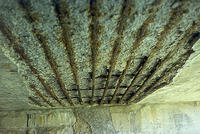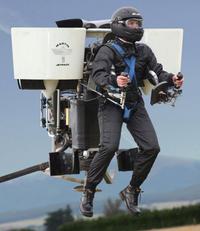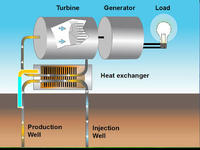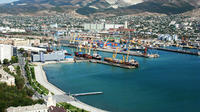-
Report warns falling crop yields could spell disaster
A recent study found that as temperatures continue to rise the geographical range of staple crops like corn and beans will become increasingly limited, potentially resulting in massive food shortages; there are currently fifty-six million people who lack food security as temperatures are expected to rise above 86° Fahrenheit; at that temperature, beans are no longer a viable crop, while rice and corn yields suffer
-
-
Scientific research, budget cuts, and DHS
The FY2011 budget of DHS’s Science & Technology Directorate (S&T) is $827 million; this year the administration’s budget proposal raised it to $1.2 billion; a measure passed by the House last week cut S&T’s FY2012 budget by 52 percent relative to the current budget — to $398 million; DHS said the cuts would stall development of technologies for border protection, detection of bio-hazards, cargo screening, and seriously disrupt research into domestic IED detection, leaving mass transit vulnerable to attacks; as we consider this dramatic cut, we should accept three things: first, the growing national debt is a threat to the well being of the United States and its security, and must be addressed; there are only two ways to address the debt issue: the government must reduce spending, or it must take in more money, or both; second, every government program must be thoroughly examined to see whether there is a justification to continue it — or continue it at the current level of funding; homeland security programs should not be exempt from such an examination; third, reasonable men and women may differ on the relevant issues: what is the nature of the homeland security threats the United States is facing; what are the best — and most cost effective — ways to meet these threats; can every last research initiative at S&T be convincingly justified?
-
-
New concrete could increase life of bridges by forty years

Researchers have developed a new type of concrete that could increase the lifespan of bridges by more than forty years compared to normal strength concrete; the more durable type of concrete minimizes shrinkage, a problem typically found in high-strength concrete; the new concrete is also less likely to crack, which reduces the ability for corrosive materials like chlorides from de-icing salts to seep into the bridge’s internal structure; the new concrete uses a lightweight porous type of sand
-
-
Emergency responders could have jetpacks by year's end

Emergency responders in New Zealand could soon be zipping around on personal jetpack; last month, Glenn Martin, an inventor based in New Zealand, successfully flew his jetpack up to a height of nearly 5,000 feet; Martin has been hard at work on the jetpack for the last thirty years and hopes to have his “jetski for the skies” commercially available within eighteen months; the jetpack is essentially two two-liter V4 engines strapped to a carbon fiber frame; the device is wingless and is controlled by two joysticks and can be flown with little pilot training; Martin says that the first people to use the device will be emergency responders conducting search and rescue missions
-
-
New tech taps Earth's deep heat

Established methods for transforming Earth’s heat into electricity involve extracting hot water from rock formations several hundred feet from the Earth’s surface at the few natural hot spots around the world, then using the hot water to turn power-producing turbines; University of Minnesota researchers developed a new system — CO2-plume geothermal system, or CPG — which uses high-pressure CO2 instead of water as the underground heat-carrying fluid; the method is expected not only to produce renewable electricity far more efficiently than conventional geothermal systems, but also help reduce atmospheric carbon dioxide (CO2) — dealing a one-two punch against climate change
-
-
Virtual water would not remedy global fresh water shortage

More than 80 percent of humanity currently lives in regions where water security is threatened, meaning that as the global population grows against a finite volume of freshwater, a more equal distribution of water use between countries will be needed; virtual water — that is, the amount of water it takes to produce goods or a service — has been suggested as a possible solution to this growing problem by using virtual water values to inform international trade deals; a new study suggests that it may not be as revolutionary as first thought
-
-
Researchers unveil biometric walk scanner
Researchers from the University of Southampton in the United Kingdom recently unveiled new biometric technology that is capable of identifying individuals by the way they walk; a professor in computer vision at the School of Electronics and Computer Science at the University of Southampton, and two PhD students have developed a system that can recognize a person by their gait with over 90 percent accuracy; individuals walking through a “biometric tunnel” were recorded on twelve cameras to create a unique signature that can be used to identify them later; researchers tried to fool the system by wearing different clothes, obscuring their faces with hats and motorcycle helmets, but the biometric system prevailed
-
-
Climate change and cities: a wake-up call

More than half the world’s population live in cities, many of which are increasingly vulnerable to the impacts of climate change; cities, however, are also emerging as the innovative “first responders” in dealing with climate change; climate change will stress cities in many ways — there will be more heat waves, threatening the health of the elderly and infirm; droughts will also become more commonplace in many cities, while in coastal communities too much water may be the problem, due to sea-level rise and more extreme coastal flooding
-
-
Suicide bombers: expedient tactics, not expression of Islam

New study argues that female suicide bombing is a political and military tactic, not a religious act; according to mainstream scholars of Islam, the Qur’an, the Hadith (traditions and practices of the Prophet Muhammad), and other principles of Shari’a (Islamic law) clearly condemn terrorist acts and oppose suicide operations; in order to justify suicide bombings, leaders of Hamas, Palestinian Islamic Jihad (PIJ), and al Qaeda have formulated their own interpretations of Islam, which are based more on military strategy than theology
-
-
House drastically cuts DHS science and technology

The Republican majority in the House last week passed a proposed DHS budget which drastically cuts the department’s Science & Technology Directorate’s (S&T) budget by 52 percent, from $827 million to $398 million; the Obama administration has requested $1.2 billion for that program in fiscal year 2012, which begins on 1 October; the S&T reductions are part of a $1.1 billion reduction in DHS’s overall budget, now $43.4 billion; the proposed DHS budget is $1 billion lower than the FY 2011 funding level, and $3 billion lower than the Obama administration’s request ; DHS officials say the decrease in S&T’s budget will wipe out dozens of programs, stalling the development of technologies for border protection, detection of bio-hazards, cargo screening; also cut will be research into domestic IED detection, leaving mass transit vulnerable to attacks
-
-
WWI, WWII-era dazzle camouflage of benefits in modern warfare

Warships in both the First and Second World Wars were painted with dazzle camouflage: startling geometric patterns aimed at confusing the enemy rather than concealing the vessel; while dazzle camouflage would probably not have successfully distorted ships’ speeds in the two World Wars, it could play a role in today’s battlefields where fast-moving army vehicles frequently come under attack from shoulder-launched, rocket-propelled grenades
-
-
Bacteria designed for sleuthing
Seven Cambridge University undergraduates spent the summer of 2009 genetically engineering bacteria to secrete a variety of colored pigments, visible to the naked eye; they designed standardized sequences of DNA, known as BioBricks, and inserted them into E. coli bacteria — so the bacteria can now change its color to red, yellow, green, blue, brown, or violet; the bacteria can be programmed to do useful things, such as indicate whether drinking water is safe by turning red if they sense a toxin; other uses for the design bacterium include monitoring food additives, patenting issues, personalized medicine, terrorism, and new types of weather
-
-
Deadly tornado kills four in Massachusetts

On Wednesday, as many as seven tornadoes tore through Massachusetts resulting in the state’s first twister related deaths in sixteen years; the tornadoes touched down in the western and central part of the state, but hit Springfield, located ninety miles west of Boston, the hardest; more than forty people have been admitted to hospitals after sustaining injuries from the tornado and four people have been confirmed dead so far; emergency responders are currently picking through the wreckage to rescue any survivors trapped in the rubble
-
-
Surprise: Thomas Edison also invented the concrete house

Historians say Thomas Edison invented and patented in 1917 an innovative construction system to mass produce prefabricated and seamless concrete houses; most people associate this style of architectural design and type of building technology with the European avant-garde of the early twentieth century; originally motivated by the objective of providing a cost-effective prototype for the working-class home, Edison’s 1917 experiment in mass-production was one of Modernism’s first attempts to construct a building with a single material
-
-
Ports unprepared for increase in Katrina-like storms

A recent report by Stanford University researchers found that the majority of seaports around the world are unprepared for rising sea levels and increasingly violent storms; a majority of ports surveyed listed sea level rise and increasing extreme storms as some of their top concerns; only 6 percent of respondents said they have plans to build hurricane barriers in the next ten years, and less than 18 percent said they had plans to build dikes or other storm protection structures; to ease uncertainty among port authorities, researchers developed a computer model to provide cost estimates that take into account a port’s specific location as well as the cost of labor, materials, and equipment for fortifying a structure against rising sea levels
-
More headlines
The long view
New Technology is Keeping the Skies Safe
DHS S&T Baggage, Cargo, and People Screening (BCP) Program develops state-of-the-art screening solutions to help secure airspace, communities, and borders
Factories First: Winning the Drone War Before It Starts
Wars are won by factories before they are won on the battlefield,Martin C. Feldmann writes, noting that the United States lacks the manufacturing depth for the coming drone age. Rectifying this situation “will take far more than procurement tweaks,” Feldmann writes. “It demands a national-level, wartime-scale industrial mobilization.”
How Artificial General Intelligence Could Affect the Rise and Fall of Nations
Visions for potential AGI futures: A new report from RAND aims to stimulate thinking among policymakers about possible impacts of the development of artificial general intelligence (AGI) on geopolitics and the world order.
Smaller Nuclear Reactors Spark Renewed Interest in a Once-Shunned Energy Source
In the past two years, half the states have taken action to promote nuclear power, from creating nuclear task forces to integrating nuclear into long-term energy plans.
Keeping the Lights on with Nuclear Waste: Radiochemistry Transforms Nuclear Waste into Strategic Materials
How UNLV radiochemistry is pioneering the future of energy in the Southwest by salvaging strategic materials from nuclear dumps –and making it safe.
Model Predicts Long-Term Effects of Nuclear Waste on Underground Disposal Systems
The simulations matched results from an underground lab experiment in Switzerland, suggesting modeling could be used to validate the safety of nuclear disposal sites.
